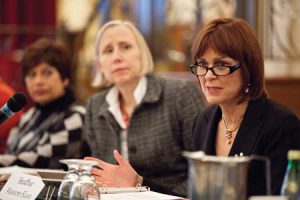
By McGill Reporter Staff
The Principal’s Task Force on Diversity, Excellence and Community Engagement is wrapping up its extensive work and consultations with a draft report that promises to become an important guidepost for the University’s administration in the years ahead.
“I am confident that this report will help to make McGill an even more inclusive and intellectually diverse community, and strengthen its capacity to achieve the highest standards in teaching, research and scholarship, and service to society here and abroad,” said Professor Heather Munroe-Blum, who has chaired the Task Force. The report also promises to complement the work of the earlier Task Force on Student Life and Learning, which set out ways to provide the support and opportunities that students need to achieve their full potential, she noted.
The report proposes initiatives to enhance diversity – broadly defined – at McGill in the years ahead. In addition to a set of recommendations, the report includes an aspirational statement on diversity that defines it as reflecting not only factors such as race and national or ethnic origin, but also other elements, such as economic status, language and culture, that contribute to an “intellectually diverse” environment.
The draft report, which has been presented to Deans, Chairs, and Directors this month, makes clear that members of the Task Force – made up of professors, students, staff and alumni – see strong links among diversity, excellence and community engagement. “Without a community comprising individuals with varied backgrounds and viewpoints, we will not be able to achieve the excellence to which we aspire,” it affirms. “Through relationships with other communities, members of the University have opportunities to share knowledge and expertise … and to gain from experiences outside our gates.”
It also emphasizes the importance of weaving interdisciplinary approaches into the fabric of the University: “Different ideas and approaches within, and indeed across, traditional disciplinary boundaries are vital for challenging assumptions, deepening our understanding of the world around us, and extending our contributions to society.”
Throughout last spring, the Task Force examined more than 60 submissions from students, staff and faculty, and invited a number of the authors to speak about their submissions and to explore themes that had emerged.
In addition to articulating broad aspirations, the report will recommend a number of specific measures. For example, the draft document calls on McGill to “encourage and support the development of interdisciplinary courses that are co-taught by instructors from different units”; to provide more recognition and visibility for community outreach work; and to “ensure that McGill takes advantage of all opportunities to create improvements in accessibility” to University buildings.
The document is scheduled for presentation to Senate on Feb. 16 and to the Board of Governors on March 15.
Principal Munroe-Blum is also expected to outline the recommendations at Town Hall meetings on March 2, at Macdonald Campus, and on March 11 at the Downtown Campus.
The final report will be submitted to Provost Anthony Masi and Vice-Principal (Administration and Finance) Michael Di Grappa, who will co-ordinate an administrative response outlining processes and timelines for implementing the recommendations, where possible. A preliminary response could come in the fall term of 2011, with a more detailed response expected to follow within a year of the Task Force issuing its recommendations.
